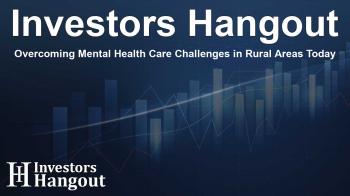Overcoming Mental Health Care Challenges in Rural Areas Today

Rural Mental Health Care: Challenges and Solutions
The reality of mental health care in rural America reveals a growing crisis. While rural communities often appear serene and uncomplicated, the mental health challenges faced by residents are anything but simple. Studies indicate that people living in these areas experience significantly higher rates of mental illnesses compared to those in urban centers. According to the Centers for Disease Control and Prevention, the suicide rate in rural regions is 49% higher than that in urban locales. Unfortunately, access to essential mental health services is severely limited in these communities.
The Invisible Barriers Affecting Rural Residents
A survey by Russell Research, conducted on behalf of Rural Minds, a strong advocate for mental health, revealed that 94% of respondents strongly believe that policymakers must make it a priority to increase access to effective mental health medications. Yet, 82% are also confronted with barriers that hinder their ability to receive care—issues rooted mainly in geographic and logistic challenges. For instance, 85% prefer obtaining medications from local pharmacies instead of enduring long trips to see healthcare providers.
Proposed Legislation: The EPIC Act
The Ensuring Pathways to Innovative Cures (EPIC) Act is currently under consideration in Congress and could provide a monumental shift in how mental health care is delivered in rural America. This pivotal legislation would facilitate research and development of "small molecule" medicines, which are more accessible for individuals in areas with fewer healthcare services. Such medications can be instrumental in treating mental health disorders effectively.
Identifying the Core Barriers
To fully grasp the extent of the problem, let's explore some of the key barriers that impede access to mental health care in rural communities:
Financial Constraints
Costs associated with mental health care, such as copays, deductibles, and health insurance premiums, significantly affect overall access. Many rural residents either lack adequate insurance or are hesitant to seek help due to the prospect of high costs. This financial strain often leads people to suffer in silence instead of reaching out for necessary support.
Awareness of Available Programs
Additionally, a lack of awareness regarding patient assistance programs poses another challenge. Many rural Americans are simply unaware of resources like the Medicine Assistance Tool—a database designed to help individuals find assistance for medications. Alarmingly, only about 60% are cognizant of programs that enhance access to essential treatment.
Geographic Isolation
Physical distance is a significant barrier, with roughly 25% of rural residents identifying long travel times to the nearest medical facilities as a hindrance to care. This isolation complicates their ability to receive both routine and specialized mental health services.
Shortage of Healthcare Providers
Adding to the problem is a stark lack of healthcare professionals. Rural areas experience a 20% shortfall in primary care physicians and an alarming 65% of rural counties do not have access to psychiatrists. This discrepancy dramatically limits the availability of mental health support.
Poor Internet Accessibility
Even as telehealth emerges as a potential solution for improving access to mental health care, many rural regions suffer from inadequate internet connectivity. The Federal Communications Commission shows that about 30% of rural residents do not have reliable access to broadband internet, rendering telehealth services impractical for many.
Taking Action for Change
It is crucial for citizens to voice their concerns about the lack of mental health services and advocate for change. Engaging with elected officials about measures, such as passing the EPIC Act, can lead to necessary improvements in mental health care accessibility. Reach out to your representatives and share your experiences regarding the mental health crisis.
By mobilizing community support and encouraging others to engage in these discussions, we can collectively push for reforms that prioritize mental health care in rural America.
Frequently Asked Questions
What is the current state of mental health care in rural America?
Rural America faces a mental health crisis, with higher rates of mental illness and suicide compared to urban areas, coupled with limited access to treatment.
How does the EPIC Act aim to improve mental health access?
The EPIC Act supports the research and development of small molecule medications, making it easier for rural residents to access necessary treatments.
What are the main barriers to mental health services in rural areas?
Key barriers include financial constraints, lack of awareness of assistance programs, geographic isolation, shortage of providers, and poor internet availability.
How can I get involved in advocating for mental health care?
You can contact your elected officials to discuss the importance of mental health policies and urge them to support initiatives like the EPIC Act.
What should I do if I need mental health care?
If you need care, reach out to nearby providers, explore telehealth options, and inquire about local assistance programs that can help reduce costs.
About The Author
Contact Olivia Taylor privately here. Or send an email with ATTN: Olivia Taylor as the subject to contact@investorshangout.com.
About Investors Hangout
Investors Hangout is a leading online stock forum for financial discussion and learning, offering a wide range of free tools and resources. It draws in traders of all levels, who exchange market knowledge, investigate trading tactics, and keep an eye on industry developments in real time. Featuring financial articles, stock message boards, quotes, charts, company profiles, and live news updates. Through cooperative learning and a wealth of informational resources, it helps users from novices creating their first portfolios to experts honing their techniques. Join Investors Hangout today: https://investorshangout.com/
The content of this article is based on factual, publicly available information and does not represent legal, financial, or investment advice. Investors Hangout does not offer financial advice, and the author is not a licensed financial advisor. Consult a qualified advisor before making any financial or investment decisions based on this article. This article should not be considered advice to purchase, sell, or hold any securities or other investments. If any of the material provided here is inaccurate, please contact us for corrections.

